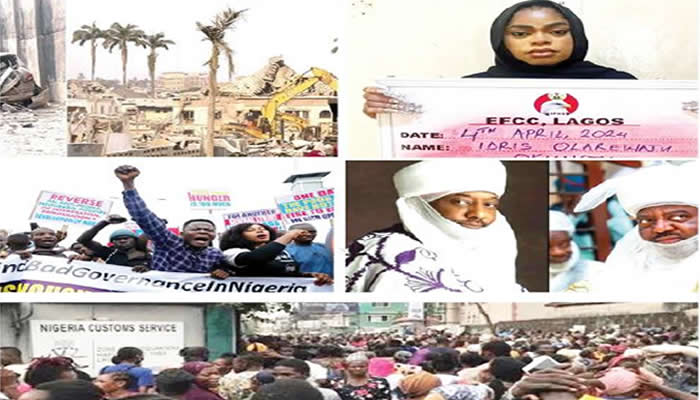A Year of Explosions, Political Turmoil, and Economic Hardship: A Reflection on 2024 in Nigeria
The year 2024 began with the jarring sound of explosions in Ibadan, Oyo State, setting the tone for a year punctuated by crises and challenges. The illegal mining-related blasts, which claimed lives, injured many, and caused significant property damage, immediately brought into focus the government’s struggle to regulate dangerous industries and protect its citizens. This incident foreshadowed the recurring theme of insecurity and vulnerability that would dominate the year’s headlines.
Political tensions simmered throughout 2024. The Kano Emirate tussle saw the removal and reinstatement of emirs, highlighting the fragility of traditional power structures and their intersection with political maneuvering. President Tinubu’s cabinet reshuffle, while intended to improve governance, generated controversy and fueled public skepticism about the effectiveness of leadership. The contentious tax reform bills further divided the nation, with strong opposition from Northern leaders raising concerns about potential economic repercussions for their region. The recurring collapse of the national grid, plunging major cities into darkness and crippling businesses, underscored the chronic infrastructural deficiencies plaguing the country and the government’s ongoing struggle to address them.
2024 also witnessed a surge in insecurity and violence, painting a grim picture of the challenges facing Nigeria. Kidnappings, banditry, and terror attacks escalated, claiming hundreds of lives across the country. The prison break in Suleja, facilitated by heavy rainfall, exposed the vulnerability of correctional facilities and the inadequacy of disaster preparedness. The collapse of the Alau Dam in Borno State resulted in a devastating flood, displacing over a million people and underscoring the urgent need for improved infrastructure and disaster management systems. These incidents, combined with the rising tide of violence, created a climate of fear and uncertainty for many Nigerians.
Economic hardship further exacerbated existing tensions. Soaring inflation, coupled with the naira’s devaluation, placed immense pressure on households and businesses. The Central Bank’s repeated interest rate hikes, while aimed at curbing inflation, also made borrowing more expensive, potentially hindering economic growth. The #EndBadGovernance protests, a powerful expression of public frustration with the rising cost of living and perceived government ineptitude, were met with brutal repression, leading to further unrest and highlighting the growing gap between the government and the governed.
Several controversial incidents further fueled public discourse and raised concerns about human rights and justice. The detention of minors involved in the #EndBadGovernance protests sparked widespread outrage, particularly given their alleged mistreatment. The imprisonment of Bobrisky, though related to the misuse of naira notes, became embroiled in a larger controversy surrounding his alleged preferential treatment. The arrest of Simon Ekpa in Finland on terrorism charges and the subsequent extradition request from Nigeria added another layer of complexity to the ongoing debate about separatism and national security.
The political landscape was further shaped by the off-cycle governorship elections in Ondo and Edo states, both marred by allegations of electoral fraud and disputed outcomes. The ongoing verbal clashes between the ruling APC and opposition parties over the 2027 presidency signaled the early stages of what promises to be a contentious election cycle. The change to the national anthem, while seemingly symbolic, highlighted the government’s ability to swiftly enact legislation, even on matters that resonated deeply with the public.
The year 2024 ended much as it began, with a sense of unease and uncertainty. The numerous crises and controversies that unfolded throughout the year underscored the deep-seated challenges facing Nigeria, from insecurity and economic instability to political tensions and human rights concerns. The government’s responses to these challenges often proved inadequate, fueling public frustration and eroding trust. As Nigeria moves into 2025, the unresolved issues of 2024 cast a long shadow, reminding citizens and leaders alike of the urgent need for meaningful change and a renewed commitment to addressing the nation’s fundamental problems. The events of 2024 serve as a stark reminder of the fragility of peace and prosperity and the ongoing struggle for a more just and equitable future for all Nigerians. The legacy of this tumultuous year will undoubtedly shape the political and social landscape for years to come.


